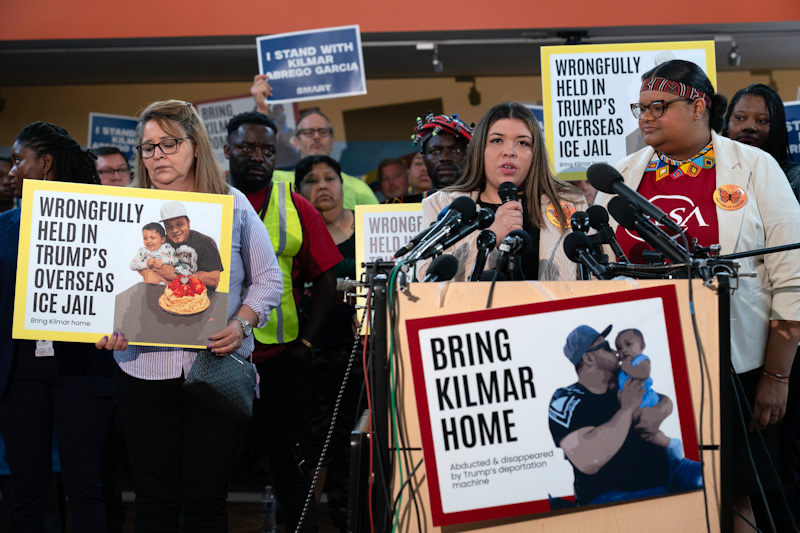DOJ Appeals Court Ruling on Mistaken Deportation of Immigrant
April 7, 2025, 2:23 PM CDT
Jennifer Vasquez Sura, wife of Kilmar Armando Abrego Garcia, speaks at a news conference following her husband’s mistaken deportation. (Photo by Jose Luis Magana/The Associated Press)
The U.S. Department of Justice (DOJ) has requested that the Supreme Court intervene in a federal judge’s order requiring the return of Kilmar Armando Abrego Garcia, an immigrant mistakenly deported to El Salvador. This development comes alongside the DOJ’s decision to place Erez Reuveni, an attorney involved in the case, on indefinite leave due to his testimony regarding the deportation.
Judicial Action Under Scrutiny
The DOJ’s appeal seeks an administrative stay against the order issued by U.S. District Judge Paula Xinis of the District of Maryland. The government asserts that the judge’s directive not only demands the reversal of a deportation but also involves negotiations with a foreign government to reinstate an individual labeled as a member of a foreign terrorist organization—an attempt they claim oversteps judicial authority.
Claims and Counterclaims
In its filing, the DOJ stated that while they acknowledge the deportation was an administrative error, the court’s ruling could infringe upon executive powers concerning foreign relations and immigration enforcement. The DOJ maintains that Judge Xinis’ approach was unprecedented and undermines the executive branch’s role.
Judge Xinis, who was appointed by former President Obama, had questioned the government’s characterization of Abrego Garcia as a gang member, asserting that there was insufficient evidence to support this claim. The DOJ’s stance hinges on the allegation that Abrego Garcia is affiliated with MS-13, a gang identified as a foreign terrorist organization by the U.S.
Attorney’s Admission and Consequences
During the court proceedings, Reuveni, the acting deputy director of the DOJ’s Office of Immigration Litigation, admitted that the removal of Abrego Garcia was indeed an error and that the government failed to present credible evidence surrounding his arrest. Notably, he commented, “The absence of evidence speaks for itself.”
Reuveni also expressed confusion over the practical difficulties in securing Abrego Garcia’s return, and when pressed by Judge Xinis for specifics, he noted that he had not received any satisfactory explanations. His handling of the case led Attorney General Pam Bondi to insist that all DOJ attorneys must vigorously advocate on behalf of the United States, suggesting that failure to comply with her directive could lead to serious repercussions.
Next Steps in Legal Proceedings
The ongoing case, identified as Noem v. Abrego Garcia, raises significant questions regarding the balance of powers between the judiciary and the executive branch in immigration matters. The DOJ’s appeal is positioned to challenge the extent of judicial overreach in matters traditionally managed by the executive.
The outcome of this case could set a precedent affecting future immigration litigation and the administration’s ability to manage deportations effectively.

